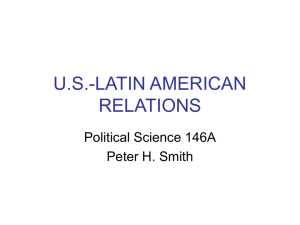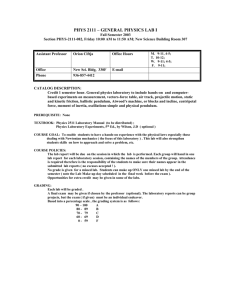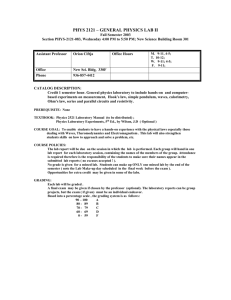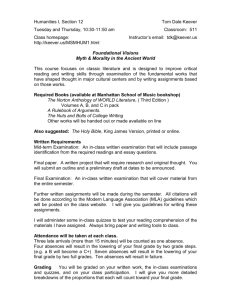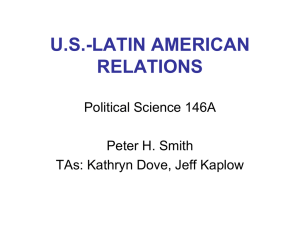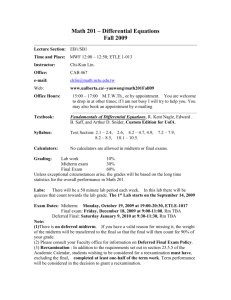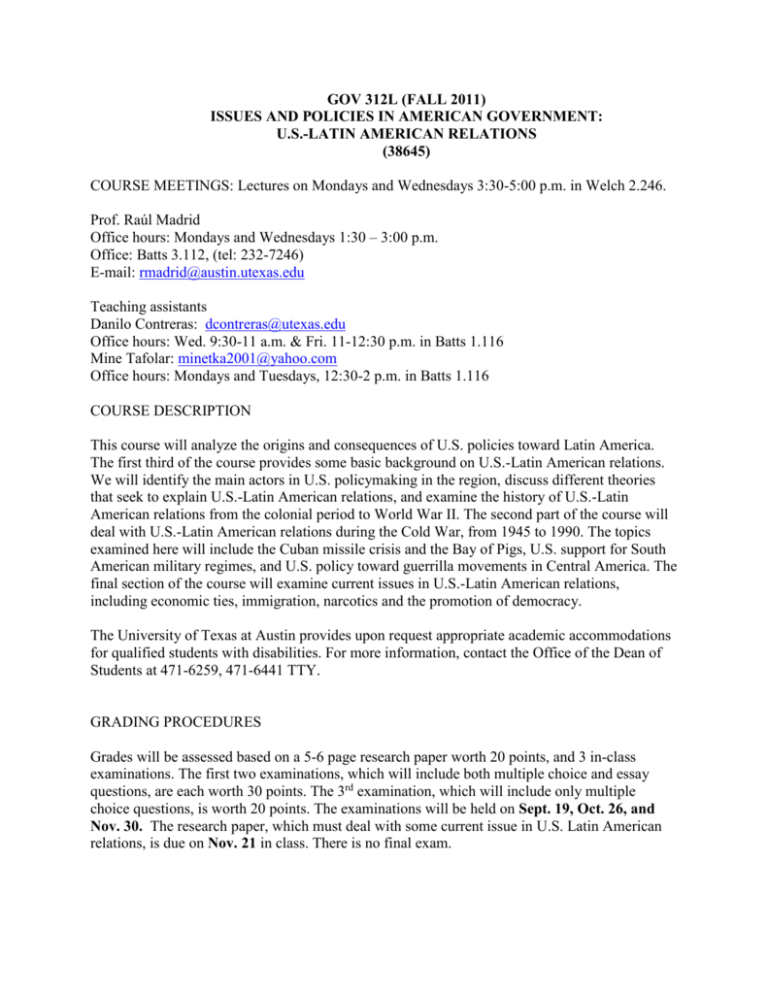
GOV 312L (FALL 2011)
ISSUES AND POLICIES IN AMERICAN GOVERNMENT:
U.S.-LATIN AMERICAN RELATIONS
(38645)
COURSE MEETINGS: Lectures on Mondays and Wednesdays 3:30-5:00 p.m. in Welch 2.246.
Prof. Raúl Madrid
Office hours: Mondays and Wednesdays 1:30 – 3:00 p.m.
Office: Batts 3.112, (tel: 232-7246)
E-mail: rmadrid@austin.utexas.edu
Teaching assistants
Danilo Contreras: dcontreras@utexas.edu
Office hours: Wed. 9:30-11 a.m. & Fri. 11-12:30 p.m. in Batts 1.116
Mine Tafolar: minetka2001@yahoo.com
Office hours: Mondays and Tuesdays, 12:30-2 p.m. in Batts 1.116
COURSE DESCRIPTION
This course will analyze the origins and consequences of U.S. policies toward Latin America.
The first third of the course provides some basic background on U.S.-Latin American relations.
We will identify the main actors in U.S. policymaking in the region, discuss different theories
that seek to explain U.S.-Latin American relations, and examine the history of U.S.-Latin
American relations from the colonial period to World War II. The second part of the course will
deal with U.S.-Latin American relations during the Cold War, from 1945 to 1990. The topics
examined here will include the Cuban missile crisis and the Bay of Pigs, U.S. support for South
American military regimes, and U.S. policy toward guerrilla movements in Central America. The
final section of the course will examine current issues in U.S.-Latin American relations,
including economic ties, immigration, narcotics and the promotion of democracy.
The University of Texas at Austin provides upon request appropriate academic accommodations
for qualified students with disabilities. For more information, contact the Office of the Dean of
Students at 471-6259, 471-6441 TTY.
GRADING PROCEDURES
Grades will be assessed based on a 5-6 page research paper worth 20 points, and 3 in-class
examinations. The first two examinations, which will include both multiple choice and essay
questions, are each worth 30 points. The 3rd examination, which will include only multiple
choice questions, is worth 20 points. The examinations will be held on Sept. 19, Oct. 26, and
Nov. 30. The research paper, which must deal with some current issue in U.S. Latin American
relations, is due on Nov. 21 in class. There is no final exam.
In order to calculate your final grade, I will sum all of the points you have received in the class
and convert the points into letter grades using the following scale:
93 and above = A
90-92 = A87-89 = B+
83-86 = B
80-82 = B77-79 = C+
73-76 = C
70-72 = C60 - 69 = D
Below 60 = F
I will round up scores of 0.5 and higher and round down scores of less than 0.5. I do not allow
extra credit assignments and no exceptions will be made to the above system of converting
points into letter grades.
Policy on Scholastic Dishonesty: Students who violate University rules on scholastic dishonesty
are subject to disciplinary penalties, including the possibility of failure in the course and/or
dismissal from the University. Since such dishonesty harms the individual, all students, and the
integrity of the University, policies on scholastic dishonesty will be strictly enforced. For further
information please visit the Student Judicial Services Web site:
http://deanofstudents.utexas.edu/sjs.
I allow students with a reasonable excuse (e.g., an illness) to make up one exam per semester
without penalty. Students who need to miss a class due to a religious holiday should notify me at
least fourteen days prior to the holiday. If you must miss a class, an examination, a work
assignment, or a project in order to observe a religious holy day, you will be given an
opportunity to complete the missed work within a reasonable time after the absence.
REQUIRED TEXTS (All books will be available for purchase at the University Bookstore and
on reserve at PCL).
Danner, Mark. The Massacre at El Mozote. New York: Vintage Books, 1994.
Kennedy, Robert. Thirteen Days: A Memoir of the Cuban Missile Crisis. New York: W. W.
Norton and Co. 1999.
Weeks, Gregory. U.S. and Latin American Relations. New York: Pearson/Longman, 2008.
In addition, a course packet will be available on Blackboard or for purchase at Paradigm (307 W.
24th St., tel: 472-7986). Readings marked with an asterisk are in the course packet.
I.
U.S. LATIN-AMERICAN RELATIONS: AN OVERVIEW
Week 1 (Aug. 24) Introduction to U.S.-Latin American Relations
Weeks, Ch. 1, (pp. 1-13).
Week 2 (Aug. 29 and 31) Key Actors in U.S. Foreign Policy toward Latin America
Kryzanek, Chs. 5-7 (pp. 123-204)*
Week 3 (Sept. 7) Theories of International Relations
Cleveland Fraser, “International Relations.” In Richard S. Hillman, ed. Understanding
Contemporary Latin America Boulder: Lynne Rienner, 1997: 151-176.*
Andre Gunder Frank. "The Development of Underdevelopment." In Robert Rhodes, ed.,
Imperialism and Underdevelopment, pp. 4-16.*
Theotonio Dos Santos. "The Structure of Dependence." in Development and
Underdevelopment: The Political Economy of Inequality. Boulder: Lynne
Rienner, 1993. pp. 193-202.*
Hans Morgenthau, Politics among Nations New York: Knopf, 1973, pp. 3-14.*
Robert O. Keohane and Joseph S. Nye. Power and Interdependence Glenview, IL: Scott,
Foresman and Co., pp. 23-37.*
Jack Snyder, “One World, Rival Theories.” Foreign Policy. Nov./Dec. 2004: 53-62.*
Week 4 (Sept. 12 and 14) The History of U.S.-Latin American Relations, pre-1945
Weeks, Chs. 2-4 (pp. 17-92)
Sept. 19. 1st examination.
II.
U.S. LATIN-AMERICAN RELATIONS DURING THE COLD WAR, 1945-1990
Week 5-6 (Sept. 21, Sept. 26 and Sept. 28) U.S.-Latin American Relations during the Cold War.
Weeks, Chs. 5-7 (pp. 93 - 165)
Week 7-8 (Oct. 3, 5, and 10) U.S. Intervention in Cuba
Kennedy, Thirteen Days (pp. 7-145).
Thomas Skidmore and Peter H. Smith, "Cuba: Late Colony, First Socialist State" in
Modern Latin America, (Sixth Edition): Oxford University Press, 2005 (pp. 263293 & 306-309).*
Week 8 (Oct. 12) U.S. Intervention in Chile
U.S. Senate, Select Committee to Study Governmental Operations. "Covert Action in
Chile, 1963-1973." U.S. Government Printing Office, Dec. 18. 1975, (pp. 1-40)*
“Fleeing the Chilean Coup: The Debate over U.S. Complicity.” Foreign Affairs (Jan./Feb.
2004): 160-65.*
Weeks 9 and 10 (Oct. 17, 19, and 24) The Central American battleground
John Coatsworth. Central America and the United States. Twayne Publishers, 1994, (pp.
122-206).*
Danner, Massacre at El Mozote (pp. 3-161).
Oct. 26. 2nd examination.
III.
CURRENT ISSUES IN U.S-LATIN AMERICAN RELATIONS
Week 11 (Oct. 31 and Nov. 2) A New Era? Democracy Promotion
Weeks, Ch. 10 (pp. 223-247)
Valenzuela, Arturo. The Collective Defense of Democracy: Lessons from the Paraguayan
Crisis of 1996. Carnegie Corporation of New York, 1999. (pp. 1-26)*
Cooper, Andrew F. and Thomas Legler. “The OAS in Peru: A Model for the Future?”
Journal of Democracy 12, 4 (Oct. 2001): 123-136*
McClintock, Cynthia. “Room for Improvement.” Journal of Democracy 12, 4 (Oct.
2001): 137-140.*
Week 12 (Nov. 7 and 9) U.S. Economic Relations with Latin America
Weeks, Ch. 8 (pp. 169 - 197)
“Free trade on Trial.” The Economist. Jan. 3, 2004: 13-16.*
Pastor, Robert. “North America’s Second Decade.” Foreign Affairs (Jan./Feb. 2004):
125-135.*
Hornbeck, J.F. “NAFTA at Ten: Lessons from Recent Studies.” Congressional Research
Service Report for Congress. Washington, CRS, 2004, pp. 1-6.*
Week 13 (Nov. 14 and 16) Immigration
Weeks, Ch. 9 (pp. 198-222)
Citrin, Jack et al. “Testing Huntington: Is Hispanic Immigration a Threat to American
Identity?” Perspectives on Politics (March 2007): 31-48.*
Garcia, F. Chris, and Gabriel R. Sanchez. Hispanics and the U.S. Political System
Upper Saddle River: Pearson Prentice Hall, 2007. Ch. 12, 267-304.*
Nov. 21. Research paper due
Week 13 (Nov. 21 and 23) U.S. Policy on Narcotics
Weeks, Ch. 11 (pp. 248 - 272).
Guillermoprieto, Alma. "Our New War in Colombia." The New York Review of Books.
April 13, 2000 (pp. 34-39).*
Veillette, Connie. “Plan Colombia: A Progress Report.” Congressional Research Service
Report for Congress. Washington, CRS, 2006, pp. 1-15.*
Week 15 (Nov. 28) Wrap-up – The Future of U.S.-Latin American Relations
No assigned reading
Nov. 30. 3rd examination.

